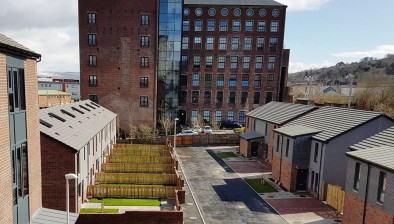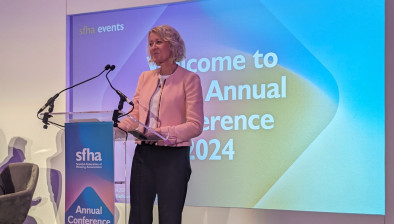Housing emergency declaration ‘must follow urgent action’, sector warns
SFHA chief executive Sally Thomas
The Scottish Government has been urged to “back words with action” and reverse the “hammer-blow” £196 million affordable housebuilding cut after it declared that Scotland was in the midst of a housing emergency.
Cabinet secretary for social justice Shirley-Anne Somerville MSP revealed yesterday that the Scottish Government, under new First Minister John Swinney, would declare the emergency, stating that it was one of the “defining issues of a generation”.
MSPs were due to debate a motion on Wednesday asking the Scottish Parliament to declare a housing emergency, following an open letter from the Scottish Federation of Housing Associations (SFHA), Shelter Scotland, and others saying that it was desperately needed.
In recent months the Scottish Government has come under intense scrutiny from housing campaigners after a £196m cut to the affordable housing supply programme was announced in the Scottish Budget under former First Minister Humza Yousaf.
Those calls have continued from SFHA who said that yesterday’s declaration of a housing emergency, while welcome, would only be meaningful if it included a renewed focus on delivering affordable rented homes and reversing the previous budget cuts.
SFHA chief executive Sally Thomas said: “(Yesterday’s) declaration is a welcome first step on a path out of the housing emergency. We know that can only be achieved through an iron-clad commitment to delivering many more affordable rented homes and, at a minimum, reversing the hammer-blow cut of almost £200m to the affordable housebuilding budget.
“With homelessness at its highest ever level and a record number of households trapped in temporary accommodation, including nearly 10,000 children, now is the time for the Scottish Government to back words with action.
“Up to 20,000 children are kept out of poverty in Scotland because they live in a social home; delivering more social homes is the best route out of our housing emergency and is also a crucial step in eradicating child poverty.
“Critically, to keep the rents affordable, it is essential that substantial funding is found from within government: we know that the Scottish Government is keen to attract more private investment, and this will only work if the financial input from government is sufficient to keep rents affordable.
“Social homes rely on public investment to be affordable for those who need them most, and if we’re not to burden housing associations with debt which will force up rents in the future.”
Watch: Scottish Labour’s debate on Scotland’s Housing Emergency at the Scottish Parliament yesterday
The sentiment was echoed by Shelter Scotland which warned that words must now follow actions.
The housing and homelessness charity has led the calls for the Scottish Government to declare a housing emergency and has urged ministers to set out an urgent plan of action to end it.
It also identified reversing the cut to the housing budget, delivering more social homes, and fully funding local homelessness services as the key priorities needed to address the housing emergency.
Shelter Scotland director, Alison Watson, said: “(Yesterday) could be a momentous day in the fight for housing justice in Scotland, but only if words are backed up with urgent action.
“It is shameful that 10,000 children in Scotland have nowhere to call home, that local homelessness services across the country are turning people away, and that so many people simply can’t afford the cost of housing.
“Now that they’ve declared a housing emergency, it’s time for our politicians to work together to deliver the actions necessary to end it; deliver the social homes we need, and make sure local services have the resources they need to do to their jobs.
“People across the country are dealing with the brutal reality of the housing emergency every day and desperately to see progress from politicians; there can now be no excuse for letting them down.”
The City of Edinburgh Council is one of five local authorities to have declared their own housing emergencies. The council has since revealed it does not expect to approve any new affordable homes for at least the next year after a cut to the Scottish Government’s housing budget left the local authority with £11 million worse off.
Following a debate in the Scottish Parliament to declare a national Housing Emergency, Councillor Jane Meagher, Housing, Homelessness and Fair Work convener, said: “It has been six and a half months since we declared Edinburgh’s housing emergency and in that time our funding from the Scottish Government has been slashed and homelessness has risen.
“It is astounding that it has taken Parliament so long to recognise this as a national emergency, but I welcome the move. To declare a housing emergency on a Scotland-wide scale points to changed priorities for the government.
“I do hope this also signals a rethink on funding for affordable housebuilding and a better housing system that works for everyone. We would be delighted to work with the government in doing the right thing and listening to the ever-growing voice that is saying: housing must be its priority.
“As the only council in Scotland to develop an action plan in response to our local housing emergency, we look forward to supporting the government on its response.”
Private rented sector
Private landlord bodies have urged the Scottish Government to focus on increasing the supply of new properties.
John Blackwood, chief executive of the Scottish Association of Landlords, said: “Although a little late, it is welcome that the Scottish Government is finally recognising that Scotland is facing a housing emergency. What is important is not to focus on blame and recriminations but to get all parties, both political and from across the housing sector, to come together to create a long-term plan that is action-focused and outcome-driven to solve the housing shortages we face.
“We need to see housing policies that are based on fact rather than ideology, on results rather than politics. We welcome any opportunity to be part of those discussions and believe plans should include building new social and owner-occupied housing as quickly as possible, alongside measures which encourage investment in the private rented sector that could have more immediate impacts in helping people find a home.”
Timothy Douglas, head of policy and campaigns at Propertymark, added: “We are now at a pivotal moment where the housing situation across Scotland has turned critical, and there needs to be immediate and practical action to deescalate the issue. For many years housing supply has not kept pace with demand and this has contributed to higher costs for all consumers and a near unworkable situation for many agents and their landlords.
“The overall situation has not been helped by Covid and the cost-of-living crisis, but we are now seeing a situation where the basic maths places the prospect of owning a home way out of limits for most people. We are also witnessing a disturbing number of local authorities placed under unfeasible pressure to provide temporary accommodation with a system that is now at absolute breaking point.
“Words must now be followed by actions and solving the housing emergency must be front and centre of the SNP administration’s programme for government. The Housing Bill provides an ideal opportunity to address the issues local authorities face, tackle affordability of housing costs through increasing supply and implement a tax regime that incentivises landlords and allows people to purchase a home of their own.”
Living Rent called on the government to follow through on its rent control commitment.
Aditi Jehangir, chair of the tenants’ union, said: “Politicians are finally waking up to the housing emergency hitting Scotland, but they need to match their words with action.
“That is why we urgently need MSPs to follow through on commitments to introduce rent controls, and not buckle to landlord lobbyists who want to see these desperately needed measures watered down and delayed.
“The Government must also reverse the cuts made to affordable housing, ensure that empty land is prioritised for social and council housing, encourage stock buy back and introduce greater protections against evictions.
“But until a strong system of rent controls is brought into law, tenants will continue to be driven into poverty by sky-high rents, and simply building more homes alone will not prevent that.”
Construction and property
Sector body Homes for Scotland (HFS), which represents organisations delivering the majority of the country’s new homes, has also supported the declaration of a national housing emergency and has asked that political leadership demonstrates a “move from a position of blame to one of solution and change”.
For HFS chief executive Jane Wood, regulatory reform is now required to increase the supply of new homes across all tenures, as well as reversing the devastating cuts to the Housing and Building Standards Budget.
Ms Wood said: “Unless the Scottish Government provides an emergency response that urgently addresses the shortfalls within the Housing Budget and the existing policy and regulatory constraints that serve only to restrict new housing supply across all tenures, today’s declaration of a national housing emergency will be no more than a symbolic gesture.
“With over a quarter of all Scottish households in some form of housing need and housing starts and completions across all tenures in freefall, recycling the same tired excuses that Brexit, cost price inflation and Westminster are the main drivers of the housing crisis just doesn’t cut it.
“Whilst these are of course significant issues, Scotland’s population and the sector that provides homes for our communities deserve better. The Government must now forensically look at the solutions and take the actions required to address the systemic underfunding of the planning system alongside a swift review of existing and forthcoming housing policy to ensure Scotland has a housing system equipped to deliver homes across all tenures.
“The first step the Scottish Government could take to show it means business is to fundamentally review the forthcoming Housing Bill to ensure that it focuses on increasing supply, rather than creating an unworkable system of rent controls that is stifling inward investment into our housing system.
“HFS and our members stand ready to work with the Scottish Government to ensure today’s declaration is matched with an appropriate emergency response which aligns with a focus on new housing delivery across the Scottish Government, local authorities and those delivering the much-needed new homes. The First Minister has the perfect opportunity to set out his approach to collaboration this Friday, as over 900 senior sector leaders meet in Edinburgh for our Annual Lunch & Awards.”
Scottish Property Federation director David Melhuish said the announcement is “an important step” which will require support across the political spectrum if the housing crisis is to be addressed.
He added: “There is no solution to this emergency without addressing the chronic lack of housing supply of all tenures in Scotland, and this declaration presents a significant opportunity to reset the government’s policy priorities.
“(Yesterday’)s announcement needs to be followed up with immediate action to prevent the damage that the current Scottish Housing Bill is doing to much-needed new investment in new rental housing.
“Rent controls have not have been successful in other European countries as they deter investment in housing, and the form they are currently proposed to take will exacerbate and not address Scotland’s housing emergency.
“This is too big a challenge for the public sector alone to address. The real estate sector is ready to make significant investments into Scottish housing but we risk losing £3.2bn of direct housing investment, including over 20,000 new rental homes, and some £4.5bn of economic value to Scotland if the Bill persists in its current form. We look forward to continuing to work with the Scottish Government to tackle what is now accepted as a national emergency.”
Paul Mitchell, operations director for the Scottish Building Federation, said: “Declaring a housing emergency in Scotland is only worthwhile if it is followed by clear actions, which not only encourage the investment needed to build new housing of all types across the country but includes a long-term plan to support companies in the building and construction sector to hire the new staff and apprentices we would need to deliver those plans.
“SBF is keen to play any role we can to make sure Scotland has the right workforce and businesses available to build homes to a high construction and environmental standard in a manner which supports and further enhances the contribution of our members to the wider Scottish economy.”
The Scottish and Northern Ireland Plumbing Employers’ Federation (SNIPEF) urgently called on government and industry leaders to launch a comprehensive national retrofit plan.
It said this strategy would harness the tens of thousands of vacant, sub-standard properties across Scotland, transforming them into energy-efficient homes and significantly alleviating the housing shortage and its environmental impact.
Fiona Hodgson, chief executive of SNIPEF, said: “Revitalising these empty properties through a national retrofit strategy is not just about providing more homes; it’s a critical step towards addressing our dual crises of housing and climate change.
“By retrofitting these homes, we improve the energy efficiency of our national housing stock, reducing overall carbon emissions and moving Scotland closer to its net-zero targets.”
SNIPEF also called for a more efficient use of government resources and stressed the importance of leveraging the knowledge and expertise within the construction sector to tackle this crisis effectively.
“We call upon stakeholders from all sectors to unite in support of this initiative, which offers a sustainable and inclusive approach to housing and environmental policy,” Ms Hodgson urged.






















